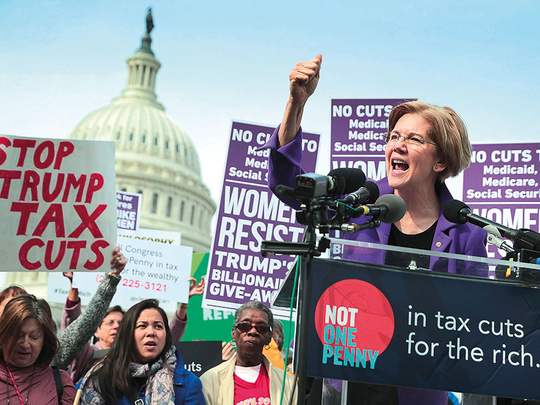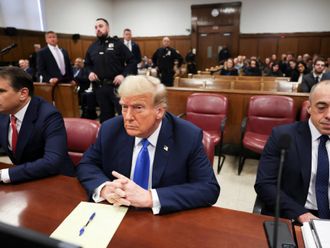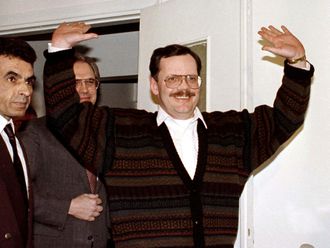
New York: Senator Elizabeth Warren has tried to put a nagging controversy behind her by apologising privately to a leader of the Cherokee Nation for her decision to take a DNA test to prove her Native American ancestry last year, a move that had angered some tribal leaders and ignited a significant political backlash.
But mixed reactions among prominent Native American critics on Friday suggested that Warren might have further to go.
Some Native American leaders gave her credit for the apology, and political figures, for the most part, played down the issue.
But others remain unsatisfied.
“This still isn’t transparent,” said Twila Barnes, a Cherokee genealogist who has been critical of Warren’s claims of native ancestry since it became national news in 2012. “She needs to go public and say she fully takes responsibility and that the DNA test was ridiculous. There is still something about this that feels off.”
The private apology comes as Warren, a Massachusetts Democrat, is set to formally launch her presidential run next week after recent visits to early nominating states like Iowa, New Hampshire and South Carolina. It also comes after repeated calls for her to apologise from tribal leaders, political operatives and her own advisers, who said her October decision to take the DNA test gave undue credence to the controversial claim that race could be determined by blood — and politically, played into President Donald Trump’s hands.
Trump has repeatedly mocked Warren for her decades-old claim of Native American ancestry, using slurs such as “Pocahontas” to dismiss her and recently saying she fell for his “Pocahontas trap.” However, when Warren hit back at Trump and released a DNA test to prove her ancestry, she angered members of the Native American community and left-leaning Democrats who believe cultural kinship and tribal sovereignty determine Native citizenship — not blood.
On Thursday, Warren called Bill John Baker, principal chief of the Cherokee Nation, to apologise for the DNA test, said Julie Hubbard, a spokeswoman for the tribe. She called it a “brief and private” conversation.
Warren’s campaign did not immediately respond to requests for comment.
“I understand that she apologised for causing confusion on tribal sovereignty and tribal citizenship and the harm that has resulted,” Hubbard said. “The chief and secretary of state appreciate that she has reaffirmed that she is not a Cherokee Nation citizen or a citizen of any tribal nation.”
The apology, which was first reported by The Intercept, is a break from Warren’s previous public stance. For months, Warren has refused to acknowledge or respond to her critics on the left, focusing instead on responding to Trump’s flurry of more openly divisive attacks, which have included language associated with racist stereotypes.
Native American tribal leaders have repeatedly criticised Trump’s language against Warren and about Native Americans more generally, but he has yet to apologise or tone down his dismissive rhetoric.
Advisers close to Warren said she has long expressed private concern that she may have damaged her relationships to Native American groups and her own standing with activists, particularly those who are racial minorities. However, as recently as December, Warren defended the decision to take a DNA test in an interview with The New York Times.
“I put it out there. It’s on the internet for anybody to see,” Warren said in December. “People can make of it what they will. I’m going to continue fighting on the issues that brought me to Washington.”
Her reversal has now drawn intense reactions from critics and supporters across the ideological spectrum.
“I’m glad to see that Elizabeth Warren has apologised for the whole DNA test debacle,” tweeted Kelly Hayes, a Native American writer who has followed Warren’s claims. “Connecting w members of the Cherokee nation in this way was always the way forward. Also, I hope that the folks who painted myself and others as fringe outliers for discussing this feel foolish.”
The reaction was more muted among political operatives, both nationally and in key early voting states like Iowa.
Dave Degner, the Democratic board chair in Tama County, Iowa, said the controversy has had minimal influence, and he has yet to hear any voters bring up the issue. Steve Drahozal, the chair of the Dubuque County Democrats in Iowa, said he was glad Warren admitted fault.
“I think she took the right step. There’s never anything wrong with getting more knowledge and saying you’ve done something silly and foolish,” Drahozal said. “I think it actually takes a lot of maturity.”
He added: “For Senator Warren to admit that she did something wrong shows she’s thoughtful and she wants to do the right thing.”
Brian Fallon, former national press secretary for Hillary Clinton, said he hopes the apology means Warren can put the issue behind her.
“It seemed from the beginning that the DNA test was an honest attempt to prevent Trump’s racist attacks from being indulged in the media, and she has seemed genuinely surprised and contrite regarding the reaction from the tribal community,” Fallon said. “It makes sense to seek to repair that relationship because in every other sense, her successful roll-out pretty successfully helped her move beyond this controversy. Now it deserves to be fully behind her.”
Hubbard, the spokeswoman, said the Cherokee Nation believes the call was prompted by a Wednesday opinion column in the Tulsa World by Chuck Hoskin Jr., the secretary of state of the Cherokee Nation. In the column, Hoskin said Warren is not a Cherokee citizen, even though her genetic test results showed strong evidence that she has a Native American pedigree “6-10 generations ago.”
Warren’s test did not take into account that, for most Native Americans, culture and kinship create tribal membership — not blood, he said.
“This concept of family is key to understanding why citizenship matters,” Hoskin wrote. “That is why it offends us when some of our national leaders seek to ascribe inappropriately membership or citizenship to themselves. They would be welcome to our table as friends, but claiming to be family to gain a spot at the table is unwelcome.”












